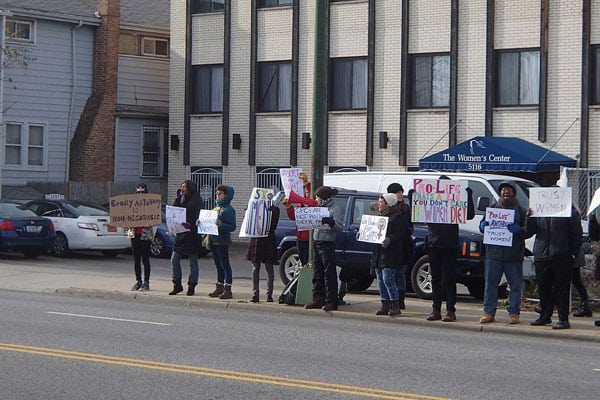
June 26, 2018; The Atlantic
Yesterday, the US Supreme Court ruled that California’s pregnancy crisis centers do not have to post the disclosure signs that were previously required by the state’s FACT Act, which passed in 2015. The act requires that sites without medical licenses state that they are not licensed medical care providers, and that sites with medical licenses acknowledge that the state provides low-cost family planning and abortion services that are not offered at the crisis centers.
Justice Clarence Thomas wrote the opinion for the five-vote majority and said,
The FACT Act unduly burdens protected speech. It imposes a government-scripted, speaker-based disclosure requirement that is wholly disconnected from the State’s informational interest. It requires covered facilities to post California’s precise notice no matter what the facilities say on site or in their advertisements. And it covers a curiously narrow subset of speakers.
What Thomas means is, the speech required by FACT goes above and beyond speech the state can legally require for the best interest of citizens, such as informed consent for medical procedures. That is sometimes known as “professional speech,” and is the basis on which the Ninth Circuit court ruled against the NIFLA clinics. Thomas said that not only has SCOTUS never recognized professional speech, it doesn’t matter because the sign requirement is neither part of informed consent nor professional regulation, and “in no way relates to the services that licensed clinics provide.” (Except, of course, that those clinics provide counseling to pregnant women and actively advocate against abortion.)
There are a number of disingenuous points to Thomas’ argument. One is that FACT requires clinics to “advocate” for abortion and family planning, when in fact all it requires is that women be informed that these things are available to them.
Dawn Laguens, Executive Vice President, Planned Parenthood Federation of America, wrote, “Fake women’s health centers are lying to women, withholding medical information, and creating barriers to health care.” Maggy Krell, Chief Legal Counsel for Planned Parenthood Affiliates of California, wrote, “Patients deserve reliable information about their options and to be treated with dignity and respect. California passed the Reproductive FACT Act to ensure that all clinics provide a simple disclosure about their license status and the availability of free or low-cost reproductive services.”
Another false point is that FACT specifically regulates the speech of those who oppose abortion and is unique in this respect. As NPQ has noted, for example, Virginia requires doctors to perform invasive ultrasounds prior to offering abortion. Alexandra Svokos at Elite Daily wrote that “[Justice Sonia] Sotomayor…linked the FACT Act to laws that require abortion providers tell patients that alternative options exist, in a practice called ‘informed consent.’ The Supreme Court approved ‘informed consent’ laws in a 1992 case.” The argument that speech at these clinics doesn’t need to be regulated the same way because it doesn’t involve consent to a medical procedure is a red herring; the clinic will never face questions of informed consent speech because it refuses to perform the procedure in question and has thus wiggled out of regulations guiding what it says to potentially vulnerable women in the guise of providing them with medical advice.
Sign up for our free newsletters
Subscribe to NPQ's newsletters to have our top stories delivered directly to your inbox.
By signing up, you agree to our privacy policy and terms of use, and to receive messages from NPQ and our partners.
In his dissent, Justice Stephen Breyer wrote, “If a state can lawfully require a doctor to tell a woman seeking an abortion about adoption services, why should it not be able, as here, to require a medical counselor to tell a woman seeking prenatal care or other reproductive health care about childbirth and abortion services?” Tellingly, his dissent was joined by all three female justices.
Part of the reason the clinics were required to post the signs is that they were engaging in deceptive practices to make it look like they were unbiased medical care providers, even though many are affiliated with churches and do not have medical licenses. Law enforcement officers described the guidebook for similar clinics in New York as “a 93-page guidebook of ways to mislead consumers.”
The case, like most SCOTUS cases, is really about the larger questions at hand. It asks, whom is the law designed to protect? Is it more important to make sure that women are always and without doubt made aware of all their healthcare options, and allow them to make their own choice? Or is it more important to avoid accidentally imposing speech upon someone that contradicts their beliefs?
Additionally, the Court has made a declaration about whose rights are more important. Dara Lind and Sarah Kliff at Vox noted recently that many white Christians now see themselves as a persecuted minority in need of protection, even though a Pew study showed that over 40 percent of Americans identify as evangelical or mainline Protestant. When SCOTUS further enshrines “protections” for a segment of the population that already enjoys significant power and influence in government, especially at the expense of people who have proportionally less, they send a message about their willingness to address systemic injustice.
Ayanna Pressley, a Boston city councilor and Congressional candidate, said,
Let me be clear: this case was not about freedom of speech, it was about disenfranchising women, specifically low-income women and women of color. Access to healthcare is a human right. So-called “crisis pregnancy centers” oftentimes engage in deceptive strategies that target at-risk women and withhold information about the full range of medical options available to them while posturing as medical professionals. These tactics are coercive and unacceptable. This decision by the Supreme Court is terribly disappointing and will harm women across the country who are in need of accurate, unbiased medical information and care.
—Erin Rubin













